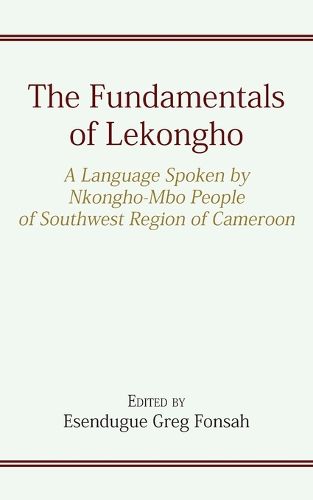Readings Newsletter
Become a Readings Member to make your shopping experience even easier.
Sign in or sign up for free!
You’re not far away from qualifying for FREE standard shipping within Australia
You’ve qualified for FREE standard shipping within Australia
The cart is loading…






This title is printed to order. This book may have been self-published. If so, we cannot guarantee the quality of the content. In the main most books will have gone through the editing process however some may not. We therefore suggest that you be aware of this before ordering this book. If in doubt check either the author or publisher’s details as we are unable to accept any returns unless they are faulty. Please contact us if you have any questions.
This book stems from a compilation of two separate research projects. The first was A Long Essay entitled Meaning of the Names of People in Mbo, Department of Linguistics, University of Buea and the other was an Essay entitled Time in Lekongho. The authors succinctly presented Nkongho- Mbo traditional names, their meaning and socio-cultural implications in the Nkongho-Mbo Speech Community. Most importantly, the researchers examined the impact of the Nkongho- Mbo names to the bearers. They explored the positivity and negativity of the selected Nkongho- Mbo names, including the meanings portrayed through the Lekongho language. In addition, they demonstrated the wealth and diversity of African languages, cultures and traditions and how they are fast losing their richness and diversity to the domineering influence of European colonialism and modernization which has drastically altered the socio-cultural, socio-economic and political conditions in Africa and given rise to a new generation of Africans who take greater pride in imbibing and promoting Europeans rather than fostering African values. The authors also addressed the Nkongho conception of time and names in a succinct analysis of how the Nkongho-Mbo people conceived, interpret and use them. The concept of time in most African cultures is very elusive, fluid and imprecise but this book has demonstrated that careful research and patient analysis can reduce that elusiveness, fluidity and imprecision. The authors have moved away from that colonial frame of mind and have shown great interest in reviving certain of the African values that have fallen prey to modernization.
$9.00 standard shipping within Australia
FREE standard shipping within Australia for orders over $100.00
Express & International shipping calculated at checkout
This title is printed to order. This book may have been self-published. If so, we cannot guarantee the quality of the content. In the main most books will have gone through the editing process however some may not. We therefore suggest that you be aware of this before ordering this book. If in doubt check either the author or publisher’s details as we are unable to accept any returns unless they are faulty. Please contact us if you have any questions.
This book stems from a compilation of two separate research projects. The first was A Long Essay entitled Meaning of the Names of People in Mbo, Department of Linguistics, University of Buea and the other was an Essay entitled Time in Lekongho. The authors succinctly presented Nkongho- Mbo traditional names, their meaning and socio-cultural implications in the Nkongho-Mbo Speech Community. Most importantly, the researchers examined the impact of the Nkongho- Mbo names to the bearers. They explored the positivity and negativity of the selected Nkongho- Mbo names, including the meanings portrayed through the Lekongho language. In addition, they demonstrated the wealth and diversity of African languages, cultures and traditions and how they are fast losing their richness and diversity to the domineering influence of European colonialism and modernization which has drastically altered the socio-cultural, socio-economic and political conditions in Africa and given rise to a new generation of Africans who take greater pride in imbibing and promoting Europeans rather than fostering African values. The authors also addressed the Nkongho conception of time and names in a succinct analysis of how the Nkongho-Mbo people conceived, interpret and use them. The concept of time in most African cultures is very elusive, fluid and imprecise but this book has demonstrated that careful research and patient analysis can reduce that elusiveness, fluidity and imprecision. The authors have moved away from that colonial frame of mind and have shown great interest in reviving certain of the African values that have fallen prey to modernization.